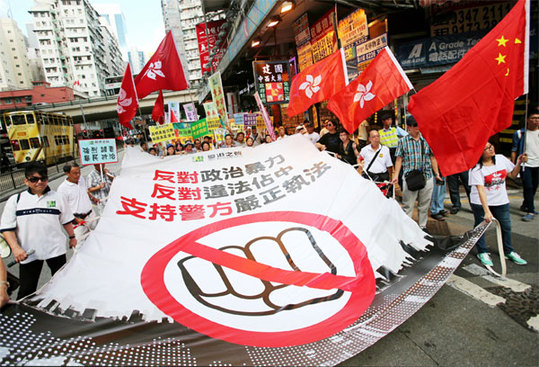Democratic fundamentalism in Hong Kong
china.org.cn / chinagate.cn by Wang Zhengxu, October 11, 2014 Adjust font size:
Pro-democracy activists in Hong Kong rallied a large crowd of citizens and students to oppose Beijing's plans for the election of Hong Kong's chief executive right before the People's Republic of China celebrated its 65th birthday. The so-called "Occupy Central" movement has impacted Hong Kong greatly and has drawn the world's attention.
|
Thousands of residents protest against opposition moves in HK. [File photo] |
Calling for universal suffrage and political freedom in Hong Kong, the "Occupy Central" movement has demonstrated its strong appeal among the general public. But like the Sunflower Student Movement in Taiwan a couple of months ago, what is happening in Hong Kong is entangled in a spate of issues including flagging economic development, a widening wealth gap, bleak job and salary prospects for the young, political and cultural conflict between Hong Kong and the mainland, conflicting national identities, competition with economic interest and so on.
In the meantime, the general public, intellectuals and government officials on the mainland have also made their voices heard, making "Occupy Central" a great opportunity to comb through the important issues surrounding democratic politics and practices in the world.
Democracy as political value
Democracy, popular sovereignty, and political independence are sacred and universal values. No one in the contemporary world can stand against democracy or democratic values.
Thus, democracy has become a politically correct term and has developed into a hegemonic discourse with an apparent sense of sacredness. Any appeal, as long as it is refashioned as an appeal for "democracy," is deemed sacred, and anyone who challenges such appeals will be labeled anti-democratic, a dictator, or a despot.
But democracy as a political value in fact opposes this kind of sanctification of any concept, right or position. Many people see democracy as power obeying public opinion. But another dimension of democracy is that any power, position or right should recognize the legitimacy and equal status of other powers, positions, and rights.



